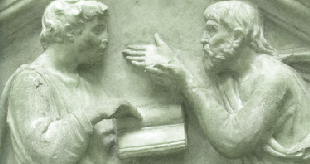Last week we attended a fine performance of Two Pianos, Four Hands at Peterborough Players. It was sometimes very funny, especially the first act, which gave a picture of the two children struggling with their pianos, their piano teachers, and their parents. (Alas, I saw myself in some of it, as the parents pushed their sons to master their instruments.) And it was sometimes poignant, as the two young musicians — very talented, very competitive, very ambitious — discovered as 17-year-olds that they didn’t really have what it takes to achieve their dreams of becoming concert pianists. They emerged from adolescence as failures.
I didn’t only identify with the overbearing fathers. For I too have had to deal with the experience of falling short of the excellence I was once sure was in store for me. It’s a hazard of being relatively talented early in life and having to discover that one is relatively mediocre on the larger stage. It’s the Peter Principle, generalized beyond the business world.
I have never had much trouble dealing with mediocrity in basketball. I was always tall (and therefore sometimes of use), but I was never a star; excellence on the court was never within my grasp, so it never became part of my sense of myself.
It was different with high school mathematics. I was always the best in my classes, and so it was quite a shock to discover my relative mediocrity in the context a city-wide math competition. The same occurred over the next 15 years to my aspirations in academia. It’s not that I wasn’t pretty good. I had no trouble getting high grades or writing papers that impressed my teachers. But the more I studied the work of really fine scholars and thinkers, the more I realized I was not in their league.
My excellence and my mediocrity were always relative, of course. In some contexts my self-esteem could go unchecked, but in the contexts that really mattered to me I was humbled — sometimes to the point of paralysis. Overestimating one’s capacities is hybris, but foregoing one’s aspirations out of a fear of confronting one’s mediocrity may just be the other side of the coin. Neither is based on mature self-acceptance.
I’ve been working on an essay about Mark Johnston’s concept of “salvation” in Saving God: Religion after Idolatry (discussed here), so perhaps that’s biasing my perspective just now, but I do find myself wondering whether there is a salvific dimension to being realistic about one’s limits without unduly emasculating one’s aspirations. It would seem to have something to do with the “love yourself” part of agapē — regarding oneself without introducing “extrinsic standards,” whether the conventional standards of one’s peer group or the unattainable standards of excellence of one’s tradition. How does one embrace both humility and self-confidence?
I was working with a student recently who was reading Emerson’s essay “Self-Reliance.” The opening paragraph argues for rejecting the authority of books and traditional learning and cultivating the authority of one’s own thinking. My house is filled with thousands of books (some of which I’ve even read — many of which I’ve long intended to read). But I suppose I should learn to regard them not only as an avenue for improving my understanding of things but also (or perhaps mainly?) as an obstacle to attaining wisdom. I’ll never match the achievements of Emerson or Johnston or a thousand others. But I suppose that recognition should not prevent me from continuing to articulate and develop some of my own thinking.
Maybe aspiring to “excellence” and avoiding “mediocrity” are overrated — or maybe they just need to be reconceived.

Comments are closed.